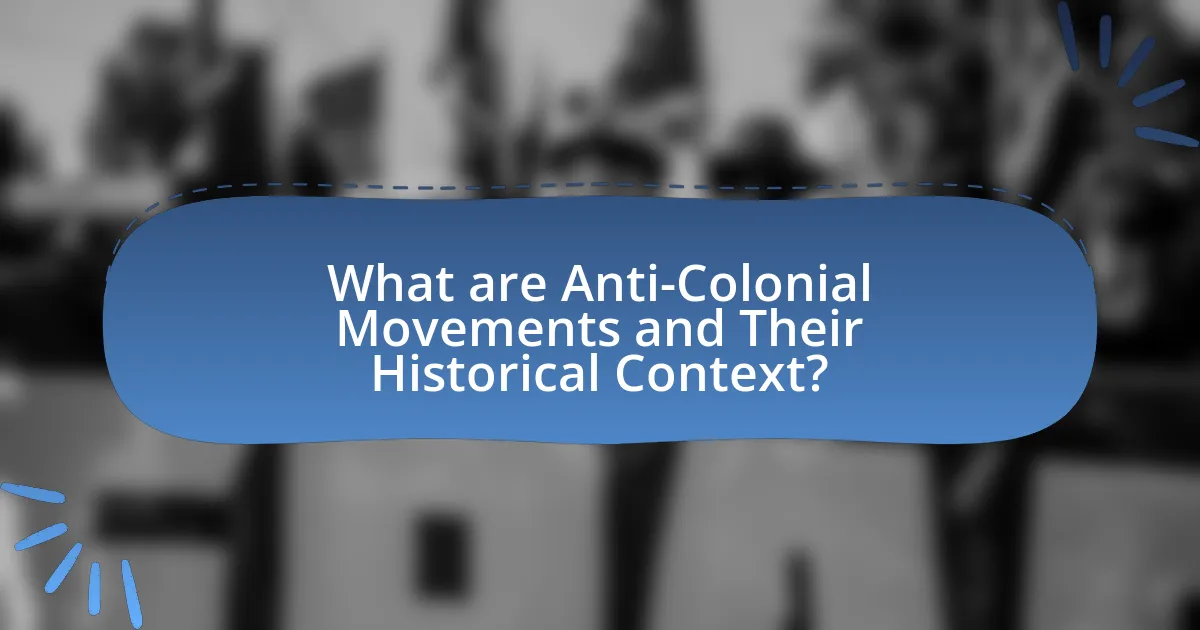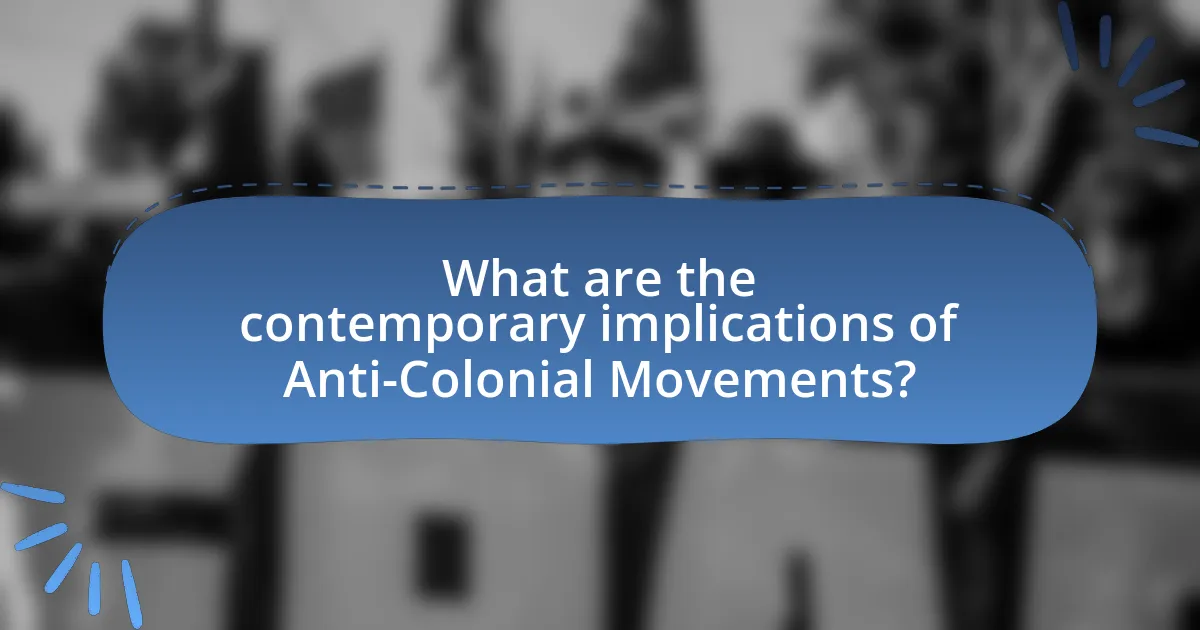Anti-colonial movements are organized efforts by colonized peoples to resist and end colonial rule, seeking self-determination and independence. Emerging primarily in the late 19th and 20th centuries, these movements gained momentum after World War II, leading to the decolonization of over 100 countries, particularly in Asia, Africa, and the Caribbean. Key figures such as Mahatma Gandhi, Kwame Nkrumah, and Nelson Mandela played significant roles in these struggles, which were fueled by ideologies of nationalism, socialism, and anti-imperialism. The impact of anti-colonial movements reshaped global politics, influenced international relations, and contributed to the development of human rights frameworks, with contemporary movements continuing to draw inspiration from these historical struggles.

What are Anti-Colonial Movements and Their Historical Context?
Anti-colonial movements are organized efforts by colonized peoples to resist and ultimately end colonial rule, seeking self-determination and independence. Historically, these movements emerged in the late 19th and 20th centuries, particularly after World War II, as global attitudes shifted against imperialism and colonialism, leading to the decolonization of Asia, Africa, and the Caribbean. For instance, India’s independence movement, led by figures like Mahatma Gandhi, culminated in 1947, while African nations such as Ghana achieved independence in 1957, reflecting a broader trend where over 100 countries gained sovereignty from colonial powers between 1945 and 1975. This historical context illustrates the significant impact of anti-colonial movements on reshaping global politics, as they challenged existing power structures and inspired other liberation movements worldwide.
How did Anti-Colonial Movements emerge globally?
Anti-colonial movements emerged globally primarily as a response to European colonial domination, fueled by a desire for self-determination and national identity. These movements gained momentum in the late 19th and early 20th centuries, particularly after World War I, when the principles of self-determination were popularized by figures such as Woodrow Wilson. The rise of nationalist sentiments, coupled with the economic exploitation and social injustices experienced under colonial rule, galvanized various groups to seek independence.
For instance, the Indian National Congress, founded in 1885, played a crucial role in mobilizing the Indian population against British rule, leading to significant events like the Salt March in 1930. Similarly, the African National Congress, established in 1912, sought to combat racial discrimination and colonial oppression in South Africa. The post-World War II era saw a surge in decolonization, with countries in Asia and Africa gaining independence through both peaceful protests and armed struggles, exemplified by the Algerian War of Independence from France (1954-1962).
These movements were often inspired by global ideologies such as Marxism and Pan-Africanism, which provided frameworks for understanding colonial oppression and advocating for social justice. The collective efforts of these movements not only led to the dismantling of colonial empires but also influenced global politics by promoting the principles of sovereignty and human rights on an international scale.
What were the key historical events that sparked these movements?
Key historical events that sparked anti-colonial movements include World War II, the Atlantic Charter of 1941, and the decolonization wave post-1945. World War II weakened European powers, leading to increased demands for independence in colonies. The Atlantic Charter, which emphasized self-determination, inspired nationalist leaders in colonized nations. The subsequent decolonization wave, marked by countries like India gaining independence in 1947 and numerous African nations in the 1960s, further fueled these movements, demonstrating a global shift towards sovereignty and self-governance.
Who were the prominent figures in the Anti-Colonial Movements?
Prominent figures in the Anti-Colonial Movements include Mahatma Gandhi, Kwame Nkrumah, Nelson Mandela, and Ho Chi Minh. Mahatma Gandhi led the Indian independence movement against British rule through nonviolent resistance, significantly influencing global anti-colonial strategies. Kwame Nkrumah was instrumental in Ghana’s independence and became a leading advocate for Pan-Africanism, promoting unity among African nations. Nelson Mandela fought against apartheid in South Africa, becoming a symbol of resistance and reconciliation. Ho Chi Minh played a crucial role in Vietnam’s struggle for independence from French colonial rule and later against American intervention, shaping the course of the Cold War in Southeast Asia. These figures collectively contributed to the global discourse on self-determination and decolonization.
What ideologies fueled Anti-Colonial Movements?
Anti-colonial movements were primarily fueled by nationalism, socialism, and anti-imperialism. Nationalism inspired colonized peoples to seek self-determination and independence from foreign rule, as seen in movements across Africa and Asia during the mid-20th century. Socialism provided a framework for critiquing colonial exploitation and advocating for economic equality, influencing leaders like Ho Chi Minh in Vietnam. Anti-imperialism united various groups against colonial powers, emphasizing solidarity among oppressed nations, exemplified by the Bandung Conference in 1955, which brought together leaders from Asia and Africa to promote cooperation and resistance against colonialism. These ideologies collectively motivated diverse anti-colonial struggles, shaping the political landscape of the 20th century.
How did nationalism influence these movements?
Nationalism significantly influenced anti-colonial movements by fostering a collective identity among colonized peoples, which galvanized their struggle for independence. This sense of shared identity and purpose motivated various groups to unite against colonial powers, as seen in the Indian independence movement led by figures like Mahatma Gandhi, who emphasized national pride and self-determination. Additionally, the rise of nationalist ideologies provided a framework for articulating grievances and aspirations, as evidenced by the Pan-African movement, which sought to unify African nations against colonial rule and promote solidarity among people of African descent. The impact of nationalism is further illustrated by the success of movements in achieving independence, such as Algeria’s liberation from French colonial rule, which was driven by a strong nationalist sentiment that rejected foreign domination.
What role did socialism and communism play in shaping Anti-Colonial ideologies?
Socialism and communism significantly influenced anti-colonial ideologies by promoting ideas of equality, collective ownership, and resistance against imperialism. These ideologies provided a framework for colonized nations to challenge colonial powers, emphasizing the need for social justice and economic independence. For instance, leaders like Ho Chi Minh in Vietnam and Kwame Nkrumah in Ghana adopted socialist principles to mobilize the masses against colonial rule, advocating for land reforms and workers’ rights. The spread of Marxist thought during the 20th century further inspired anti-colonial movements, as it framed colonialism as a form of capitalist exploitation. This ideological alignment facilitated international solidarity among oppressed nations, leading to coordinated efforts against colonial powers, exemplified by the Non-Aligned Movement, which sought to unite countries resisting imperialism.

How have Anti-Colonial Movements influenced Global Politics?
Anti-colonial movements have significantly influenced global politics by promoting self-determination and challenging imperialist structures. These movements, such as India’s struggle for independence led by figures like Mahatma Gandhi and the African National Congress in South Africa, inspired a wave of decolonization across Asia, Africa, and the Caribbean during the mid-20th century. The United Nations General Assembly adopted Resolution 1514 in 1960, which affirmed the right to self-determination and led to the independence of numerous nations. This shift not only altered the political landscape of former colonies but also encouraged global solidarity among oppressed peoples, fostering international support for human rights and anti-imperialist policies. The legacy of these movements continues to shape contemporary discussions on sovereignty, global governance, and social justice.
What impact did these movements have on international relations?
Anti-colonial movements significantly reshaped international relations by promoting self-determination and challenging colonial powers. These movements led to the emergence of new nation-states, which altered geopolitical dynamics and created a shift in alliances. For instance, the decolonization of Africa in the mid-20th century resulted in the formation of over 50 independent countries, fundamentally changing the political landscape and leading to the establishment of the Non-Aligned Movement in 1961, which sought to create a third path in the Cold War context. This shift not only diminished the influence of colonial powers but also encouraged solidarity among newly independent nations, fostering a collective voice in international forums such as the United Nations.
How did Anti-Colonial Movements affect the formation of new nations?
Anti-colonial movements significantly influenced the formation of new nations by mobilizing populations against colonial rule and advocating for self-determination. These movements, such as India’s struggle for independence led by figures like Mahatma Gandhi, inspired similar efforts across Asia, Africa, and the Caribbean, leading to the emergence of sovereign states post-World War II. The decolonization process, particularly between 1945 and 1975, saw over 100 nations gain independence, driven by the ideologies and strategies developed during these anti-colonial struggles. For instance, the African National Congress in South Africa and the Mau Mau Uprising in Kenya exemplified how organized resistance against colonial powers directly contributed to national identity formation and eventual independence.
What role did these movements play in the Cold War dynamics?
Anti-colonial movements significantly influenced Cold War dynamics by aligning newly independent nations with either the Soviet Union or the United States, thereby shaping global power structures. These movements often sought support from superpowers to bolster their struggles against colonial rule, which in turn allowed the superpowers to expand their ideological influence. For instance, countries like Cuba and Vietnam received substantial backing from the Soviet Union, while others, such as India, adopted a non-aligned stance, complicating the binary Cold War narrative. The Bandung Conference in 1955 exemplified this trend, as it brought together leaders from various anti-colonial movements to promote solidarity and resist imperialism, further entrenching the ideological divide between capitalism and communism during the Cold War.
How did Anti-Colonial Movements shape global governance structures?
Anti-colonial movements significantly shaped global governance structures by advocating for self-determination and influencing the establishment of international norms regarding sovereignty and human rights. These movements, particularly in the mid-20th century, led to the decolonization of numerous nations, which in turn prompted the formation of new governance frameworks such as the United Nations. The UN Charter, adopted in 1945, emphasized the principle of equal rights and self-determination of peoples, reflecting the demands of anti-colonial activists. Additionally, the Non-Aligned Movement, initiated in the 1950s, further challenged existing power dynamics by promoting a collective voice for newly independent states, thereby reshaping diplomatic relations and global governance priorities.
What influence did these movements have on the United Nations and international law?
Anti-colonial movements significantly influenced the United Nations and international law by promoting the principles of self-determination and human rights. These movements led to the establishment of key UN documents, such as the Declaration on the Granting of Independence to Colonial Countries and Peoples in 1960, which recognized the right of all peoples to self-determination. Furthermore, the influence of anti-colonial activism contributed to the development of international legal frameworks that address issues of sovereignty and territorial integrity, as seen in the UN Charter and subsequent resolutions. The push for decolonization resulted in the admission of numerous new member states to the UN, reshaping the organization’s agenda to include issues of colonialism and imperialism, thereby embedding these principles into international law.
How did Anti-Colonial Movements contribute to the development of human rights frameworks?
Anti-colonial movements significantly contributed to the development of human rights frameworks by advocating for self-determination, equality, and justice for oppressed populations. These movements, which emerged in the mid-20th century, highlighted the injustices of colonial rule and emphasized the need for universal human rights as a response to systemic oppression. For instance, the African National Congress in South Africa and the Indian independence movement led by figures like Mahatma Gandhi articulated principles of human dignity and rights that resonated globally. The 1948 Universal Declaration of Human Rights was influenced by these movements, as they underscored the necessity of protecting individual rights against state abuses, thereby embedding anti-colonial ideals into international human rights discourse.

What are the contemporary implications of Anti-Colonial Movements?
Contemporary implications of anti-colonial movements include the promotion of self-determination, the re-evaluation of historical narratives, and the emergence of new political identities. These movements have led to increased awareness of social justice issues and have influenced global policies regarding human rights and economic equity. For instance, the decolonization process in Africa and Asia has resulted in the establishment of independent states that advocate for sovereignty and cultural preservation, impacting international relations and trade agreements. Additionally, the resurgence of indigenous rights movements worldwide reflects the ongoing influence of anti-colonial sentiments, as seen in the recognition of land rights and cultural heritage in countries like Canada and New Zealand.
How do modern movements draw inspiration from historical Anti-Colonial struggles?
Modern movements draw inspiration from historical anti-colonial struggles by adopting their strategies of resistance, emphasizing self-determination, and invoking the narratives of past leaders. For instance, contemporary social justice movements often reference the tactics used by figures like Mahatma Gandhi and Nelson Mandela, who employed nonviolent protest and civil disobedience to challenge colonial powers. Additionally, the principles of sovereignty and cultural identity championed during anti-colonial movements resonate in today’s calls for indigenous rights and decolonization efforts. The Black Lives Matter movement, for example, parallels the anti-colonial fight against systemic oppression, drawing on historical contexts to frame its struggle against racial injustice. This connection illustrates how the legacies of anti-colonialism continue to inform and empower modern activism, reinforcing the ongoing relevance of these historical struggles in contemporary global politics.
What parallels can be drawn between Anti-Colonial Movements and current social justice movements?
Anti-colonial movements and current social justice movements share the common goal of challenging systemic oppression and advocating for marginalized communities. Both movements emphasize the importance of self-determination, as seen in anti-colonial struggles for independence from imperial powers, which parallels contemporary demands for racial, gender, and economic equity. For instance, the civil rights movement in the United States drew inspiration from anti-colonial leaders like Mahatma Gandhi and Nelson Mandela, highlighting the interconnectedness of these struggles. Furthermore, both movements utilize grassroots organizing and coalition-building to mobilize support, as evidenced by the global Black Lives Matter movement, which echoes the collective action seen in historical anti-colonial efforts. These parallels illustrate how the legacies of anti-colonial movements continue to inform and shape modern social justice initiatives.
How do Anti-Colonial legacies influence current political discourse?
Anti-colonial legacies significantly influence current political discourse by shaping national identities and informing debates on sovereignty and self-determination. These legacies often manifest in the rhetoric of political leaders and movements that emphasize resistance to imperialism and the importance of reclaiming cultural heritage. For instance, many post-colonial states utilize anti-colonial narratives to critique neocolonial practices and advocate for economic independence, as seen in the policies of leaders like Hugo Chávez in Venezuela, who framed his government’s initiatives as a continuation of anti-colonial struggles. Furthermore, contemporary social movements, such as Black Lives Matter, draw on anti-colonial frameworks to address systemic racism and inequality, highlighting the ongoing impact of colonial histories on modern societal structures. This connection between past struggles and present political agendas underscores the enduring relevance of anti-colonial legacies in shaping discourse around justice, equity, and global power dynamics.
What lessons can be learned from Anti-Colonial Movements for today’s political landscape?
Anti-colonial movements teach the importance of self-determination and the necessity of grassroots mobilization in today’s political landscape. These movements, such as India’s struggle for independence led by figures like Mahatma Gandhi, emphasized the power of collective action and nonviolent resistance against oppressive regimes. The success of these movements demonstrates that sustained activism can lead to significant political change, as seen in the decolonization of numerous African nations in the mid-20th century, where local populations organized to reclaim their sovereignty. Furthermore, anti-colonial movements highlight the need for international solidarity, as global support played a crucial role in their successes, illustrating that contemporary movements can benefit from building alliances across borders to address shared challenges.
How can contemporary activists apply strategies from Anti-Colonial Movements?
Contemporary activists can apply strategies from Anti-Colonial Movements by utilizing grassroots organizing, coalition-building, and direct action to challenge systemic injustices. Grassroots organizing, as seen in movements like the Indian independence struggle led by Mahatma Gandhi, emphasizes mobilizing local communities to advocate for their rights and needs. Coalition-building, exemplified by the Pan-African movement, fosters solidarity among diverse groups to amplify voices against oppression. Direct action, a tactic used by figures such as Nelson Mandela during the anti-apartheid struggle, serves to disrupt unjust systems and draw attention to critical issues. These strategies have proven effective in creating social change and can be adapted to address contemporary challenges such as racial inequality, climate justice, and economic exploitation.
What best practices can be derived from the successes and failures of these movements?
Best practices derived from the successes and failures of anti-colonial movements include the importance of grassroots mobilization, the necessity of a clear and unified vision, and the strategic use of nonviolent resistance. Grassroots mobilization fosters community engagement and builds a broad base of support, as seen in India’s independence movement led by Mahatma Gandhi, which effectively united diverse groups against colonial rule. A clear and unified vision, exemplified by the African National Congress during the struggle against apartheid, helps maintain focus and direction, ensuring that the movement’s goals resonate with the populace. Additionally, the strategic use of nonviolent resistance, as demonstrated by movements in South Africa and the Civil Rights Movement in the United States, has proven effective in garnering international support and delegitimizing oppressive regimes. These practices highlight the significance of community involvement, clarity of purpose, and nonviolent strategies in achieving political change.


